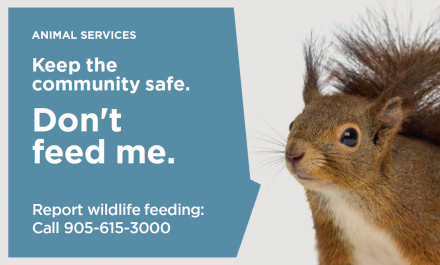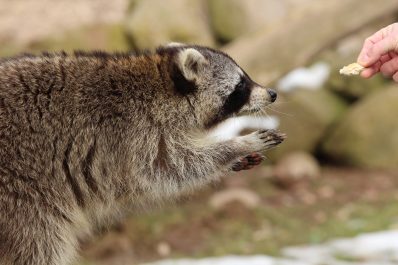Don’t Feed Wildlife! It Isn’t a Good Thing
Environment | April 7, 2022
While feeding ducks at the park might sound enchanting and magical – it does more harm than good. You might think you’re helping a poor little animal find food, but you’re just adding to a bigger problem. More and more wildlife species like robins, squirrels and chipmunks are becoming dependant on humans for food.
If you’re feeding wild animals food like bread, nuts or leftovers, chances are, someone else is too. It only conditions these animals to rely on humans to provide them food. As a consequence, wildlife will start to worry less about finding their own food and become more dependant on humans.
Don’t feed wildlife. It has consequences and can cause animals to:
- Become dependent on artificial food sources and stop searching for food naturally. This is not healthy and can lead to illness or disease.
- Lose their natural fear of humans and pets, and become more likely to approach you.
- Gather in large numbers when food is easily available – leading to more diseases and may destroy natural habitats.
Wild animals like raccoons, birds, foxes and coyotes should always look for food and shelter on their own. This is important since it helps wildlife develop and maintain their natural adaptation skills for long-term survival. It’s also important so that wildlife aren’t scavenging properties for food or becoming aggressive, expecting food when they come across humans.
Feeding wildlife also has negative impacts for people, including:
- Attracting other unwanted pests, such as rats and mice, which can attract larger predators like coyotes that can prey on neighbourhood pets.
- Increasing nuisance wildlife activity and unsanitary conditions – such as raccoons taking up residences in attics, skunks burrowing beneath sheds or bird droppings that can damage property and pose a health risk.
- Entering urban areas, putting them in danger of being hit by vehicles and causing accidents, resulting in property damage, injury or death.
- Posing a health risk when animals get too close to you if they’re carrying diseases like rabies.
Under the City’s Animal Care and Control By-law – feeding wildlife is illegal. There is a $300 minimum fine for feeding wildlife. This includes leaving food out, food waste and disposing of food in natural areas.
The City’s Animal Services staff continue to educate residents and patrol areas of the city where intentional feeding is a concern. Mississauga residents and visitors are encouraged to enjoy and live in harmony with wildlife by not interfering with their natural instincts and behaviours.
Learn more about urban wildlife by visiting mississauga.ca/wildlife.
Tags
Media contact
City of Mississauga Media Relations
media@mississauga.ca
905-615-3200, ext. 5232
TTY: 905-896-5151

